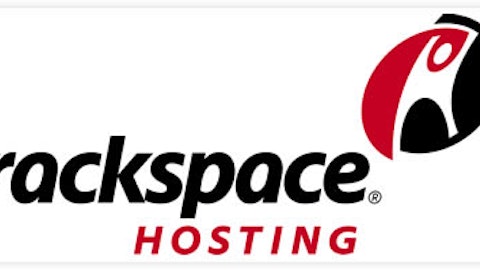The fastest way to a billion dollar valuation is to announce that your company is working on the cloud or a new mobile app. Either way, your company is sure to get plenty of analyst attention, and also a bloated valuation. Rackspace Hosting, Inc. (NYSE:RAX) is one company enjoying its sky-high valuation due solely to its association with the cloud, not its underlying business.
Recent earnings and the subsequent shareholder response shows how the company is falling out of favor with investors. In Rackspace’s Feb. 12 earnings release it posted revenue of $352.9 million and GAAP earnings per share of $.21. The company beat on revenues and met consensus on earnings, neither of which seemed to matter when the stock price shrunk by nearly 20% in just two trading days.
Why investors are dumping Rackspace
Rackspace competes in one of the most commoditized businesses out there: website hosting, cloud computing, and server leasing. Rackspace is a tech company in datacenters only; to its customers it is little more than a financing scheme through which businesses can pay a set price for a shared part of one or many servers.
That’s what the cloud is all about: borrowing a little bit of computer time only when necessary and paying for it in piecemeal. This business model has been done over and over again, just in different industries.
It’s really not all that different than Amazon.com, Inc. (NASDAQ:AMZN)‘s Web Services, which sells EC2 cloud computing at comparable prices to Rackspace. And truthfully, Rackspace isn’t very different from Zipcar Inc (NASDAQ:ZIP), which bought cars then leased them by the hour or day. ZipCar was once as hot at Rackspace, only to be bought out at a forward earnings multiple of 28 and two times book value with the assumption that Avis Budget Group Inc. (NASDAQ:CAR) could bring cost-saving synergies to add value. Rackspace would be hardpressed to find a suitor at the current multiple of 46 times forward earnings and 10 times book value given the few cost savings that could be squeezed from the much more competitive cloud computing industry.
Rackspace and Amazon are both in the business of building out large datacenters then effectively leasing them in bite-sized pieces to thousands of customers. The problem is that once one accounts for depreciation and amortization, the business really isn’t all that profitable. It runs on the same basic microeconomics as an unregulated utility company. It’s a high capex, low value-add business where the customer does not have a shred of loyalty to his or her provider.






